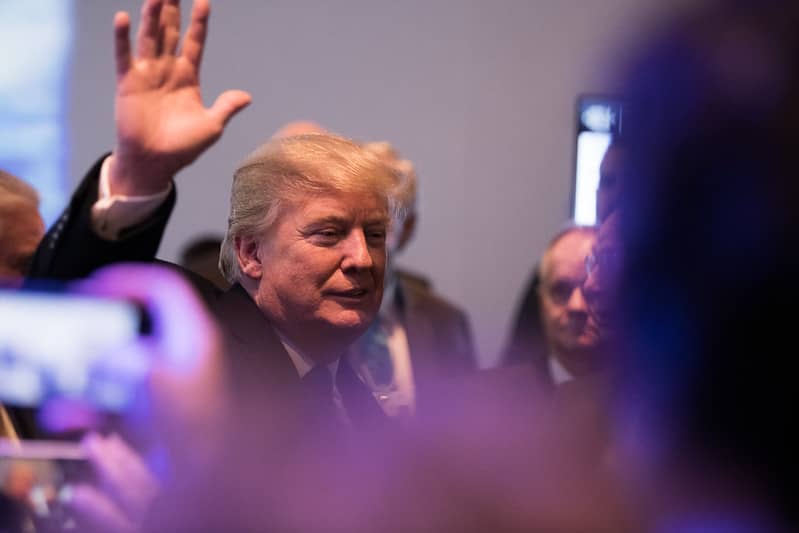Trump Tells Davos U.S. to be "World Capital of AI and Crypto"
- Written by: Sam Coventry
-

Image Copyright by World Economic Forum / Mattias Nutt.
President Trump told the World Economic Forum in Davos that he would make America "the world capital of AI and crypto."
The comments are the first direct mention of crypto made by the President since his inauguration.
He said an increase in domestic oil and gas production will secure U.S. manufacturing dominance and make it "the world capital of artificial intelligence and crypto."
Industry insiders had grown concerned by the lack of a direct mention of crypto by the President since being sworn in on Monday.
Bitcoin prices rose following the mention, while also catching a boost on news Senator Cynthia Lummis was confirmed as chair of the Senate Banking Subcommittee on Digital Assets.
She said wants to "urgently pass" legislation for a Strategic Bitcoin Reserve.
"Every legislator is giving this legislation a serious look. The time is now. The President is a visionary leader and we are ready to get this bill to his desk," she said of her proposed Bitcoin Strategic Reserve Bill.
Trump had previously suggested a major shift in U.S. cryptocurrency policy, declaring that the nation is "going to do something great with crypto."
The statement signals a potential move toward greater acceptance and regulatory clarity for digital currencies, a significant departure from his past criticism of Bitcoin as a “scam” and a threat to the U.S. dollar.
Trump’s comments hinted at a more favourable environment for cryptocurrency innovation, with implications for regulation, investment, and technological development.
These are now in train and mark progress towards more regulatory clarity. The U.S.’s fragmented crypto laws could see a unified, coordinated framework, fostering innovation while safeguarding financial security.
Trump's crypto-friendly stance looks set to drive further growth in the digital currency sector.
Clearer policies may encourage startups and developers to push blockchain advancements, positioning the U.S. as a leader in the global crypto space.
According to Joshua Rawlings, a digital currency expert, the increasing use of digital currencies is observable in numerous online industries, including online gaming, where users seek faster payments and fewer charges.
He cites the example of crypto casinos at casino.online, which use Bitcoin and other cryptocurrencies to facilitate faster, anonymous, and safer deals that are preferable in gaming segments.
Historically, U.S. administrations have approached cryptocurrencies with caution, citing risks like money laundering and price volatility. Trump’s remarks suggest a pivot toward embracing the potential of blockchain technology and digital currencies.
Criticism of former President Joe Biden's policies from the crypto industry centred on regulatory uncertainty, overreach, and a perceived lack of support for innovation. Criticisms include:
1. Lack of Regulatory Clarity
Unclear Rules on Cryptocurrencies: Critics argue that the Biden administration has not provided clear guidelines on how cryptocurrencies should be classified and regulated (e.g., whether they are securities, commodities, or something else). This lack of clarity has led to uncertainty for businesses and investors.
SEC’s Enforcement-First Approach: Under SEC Chair Gary Gensler, the agency has pursued numerous enforcement actions against crypto companies rather than issuing clear regulatory frameworks. Many in the industry see this as stifling innovation.
Unpredictability: Industry leaders have voiced frustration with inconsistent messaging from regulatory bodies like the SEC and CFTC, which sometimes issue conflicting statements about their jurisdiction over crypto.
2. Hostility Toward Crypto Innovation
Perception of Anti-Crypto Stance: Some believe the Biden administration views crypto more as a risk than an opportunity, focusing primarily on potential harm (e.g., fraud, scams, environmental concerns) rather than promoting innovation.
"Operation Choke Point 2.0" Allegations: Industry figures have accused the administration of pressuring banks to sever ties with crypto companies, limiting access to banking services and stifling the growth of blockchain-based businesses.
3. Overregulation Concerns
Proposed Tax Reporting Rules: The administration's push for stricter tax reporting on crypto transactions has been criticized for being overly broad, potentially requiring invasive data collection from businesses and individuals.
Burdensome Compliance: Crypto advocates argue that policies like the reporting of all transactions above $10,000 could impose undue burdens on smaller businesses and individuals who use or mine crypto.
4. Environmental Criticism of Crypto Mining
Focus on Environmental Impact: The Biden administration has highlighted concerns about the energy-intensive nature of crypto mining, particularly with proof-of-work cryptocurrencies like Bitcoin. Some in the industry feel this focus ignores efforts to develop greener solutions and overlooks other high-energy industries.
5. Impact on U.S. Competitiveness
Driving Innovation Offshore: Critics argue that the administration's regulatory approach risks pushing crypto innovation to other countries with friendlier regulatory environments (e.g., Switzerland, Singapore). This could undermine U.S. leadership in blockchain and Web3 technologies.
6. CBDCs and Crypto Competition
Preference for Central Bank Digital Currencies (CBDCs): Some crypto advocates believe the administration's interest in developing a U.S. CBDC could marginalize decentralized cryptocurrencies, with fears that it could lead to greater surveillance and control over individual finances.
7. Public Perception
Framing Crypto Negatively: Critics claim that the administration has leaned heavily into narratives about crypto's role in money laundering, scams, and tax evasion, creating a negative public perception without acknowledging the industry's potential benefits (e.g., financial inclusion, innovation, and decentralized finance).





